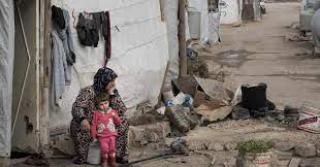Veja Também -
 Minas Gerais entrega Medalha da Inconfidência a 171 personalidades e instituições
Minas Gerais entrega Medalha da Inconfidência a 171 personalidades e instituições Projeto 'Antes do Voto 2024' chega a Governador Valadares, Montes Claros e Uberlândia
Projeto 'Antes do Voto 2024' chega a Governador Valadares, Montes Claros e Uberlândia Projeto apoia população negra, minorias e influencers em Montes Claros
Projeto apoia população negra, minorias e influencers em Montes Claros Nova rodoviária de Governador Valadares impede acesso de populares; só com passagens
Nova rodoviária de Governador Valadares impede acesso de populares; só com passagens Projeto 'MP em Movimento, chega a Montes Claros, em 18 de abril
Projeto 'MP em Movimento, chega a Montes Claros, em 18 de abril- Veja + Revelia News
Revelia News
Postado dia 23/07/2022 às 14:25:47
Yemen: hunger is overflowing during the war in Ukraine

Yemen is one of the countries most affected by the stop on grain imports from Ukraine. This situation highlights how the consequences of the conflict can go far
The consequences of a conflict, both local and regional, hardly ever remain within the boundaries of the territory where it originated. Although it is sometimes difficult to examine how a conflict impacts other contexts, this is what happens. The war in Ukraine started last February 24, which is an example of it, and Yemen is one of the main countries affected by the consequences of the war. After seven years of conflict in Yemen, one of the most serious humanitarian emergencies in the world is making worse due to the already deep food crisis. The global food crisis, caused by the block on exports from Ukrainian ports to the main importing countries, is now displayed in the Yemeni territory.
The imports from Ukraine represent 31% of wheat that arrived in the country in the last 3 months. Prices have risen dramatically to seven times higher than in 2015 (OCHA source). Storage capacity at the main ports of Aden and Hodeida manages to cover only 20% of annual requirements, leading to high exposure to price volatility in international trade. At this moment, a kilogram of wheat flour costs on average more than 800 rials in the south of the country, compared to 146 rials before the crisis. “The cost of the food basket had already quadrupled over the 2021”, Mattia Leveghi says, INTERSOS aid worker in Yemen, “inflation continues to rise, and we need to also add the lack of oil, despite the richness of this source in Yemen. Moreover, the structural shortage of drinking water is exacerbated by climate change”.
The health system has been irreparably weakened by the conflict: half of the medical facilities are not functioning at this moment, and the sanitary conditions of thousands of people are truly precarious. This context makes the risk of malnutrition even more concrete for a large part of the population. In these conditions, humanitarian intervention increasingly assumes a crucial role in the survival of the most vulnerable. But it may prove to be partially ineffective when it suffers severe economic cuts. As a matter of fact, over the last two years, there has been a general reduction in the funds available for humanitarian response in Yemen which has been exacerbated by the crisis in Afghanistan (August 2021) and now by the crisis in Ukraine. “The outbreak of the war in Ukraine has implicated less focus on other crises and the availability of fewer funds”, Leveghi says, “Although the population who need humanitarian assistance and protection has increased from 21,7 to 24,3 million between 2021 and 2022, at this moment only 27% of necessary funds for 2022 have been guaranteed. This situation has caused the reduction or the suspension of essential interventions, including basic medical services: between the end of 2021 and July 2022, we had to suspend our support to about 21 medical facilities and mobile health clinics in the country”.
The numbers of malnutrition
In the meantime, the numbers related to malnutrition are rising. There are about 50,000 children who do not receive enough food each day, therefore, they are suffering from what is called severe malnutrition. More than 2 million children have reached the level of severe malnutrition, the same level as 1,3 million pregnant or lactating women. Moreover, 4,6 million people do not have the access to safe drinking water. Since December 2020 it has registered an increase of 29% of people in a food crisis state: it is about 18 million people (OCHA).
“Last year we provided nutrition services to about 265,000 people in all areas where we operate, intervening with both prevention and treatment activities. In this way, we reached more than 53 thousand children under the age of five, and we treated more than 3 thousand with acute malnutrition. Therefore, there are lactating or pregnant women who are in a state of malnutrition: in 2021 we treated more than 2 thousand of them”, Leveghi explains.
In a worsening situation, the latest analysis predicts that about 160,000 people will be in a state of famine by the end of the year, the most severe range of food insecurity states. “Only Humanitarian organizations will not be able to face this acute phase without a real intervention from the international community, without considering also that the war in Ukraine is worsening the situation”, Leveghi concludes.




